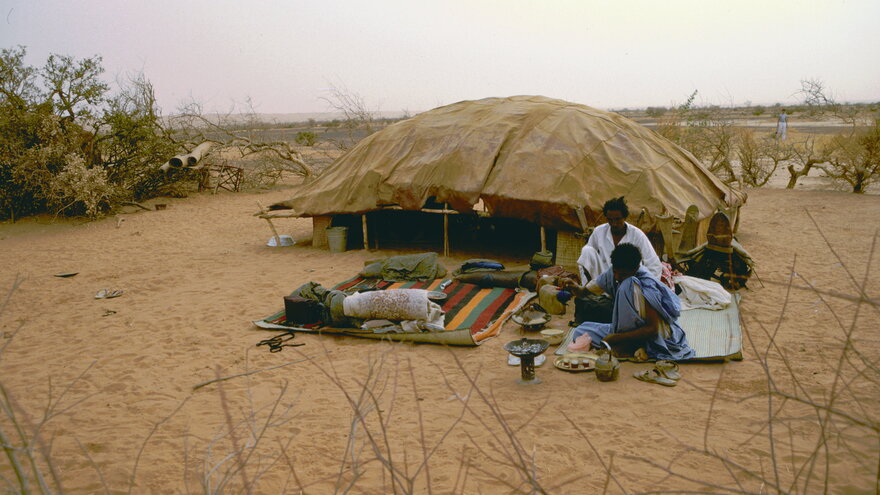About
The African Sahel has seen an escalating crisis during the last decade. This is primarily a crisis of politics and governance leading to an armed 'jihadist' insurgency that first emerged in northern Mali and northern Nigeria and which later spread to neighbouring areas and countries. In addition, migration from the Sahel to the Mediterranean region increased and peaked during the refugee crisis in Europe in 2015.
Still, there are considerable knowledge gaps on why increasing numbers of young men in the Sahel choose to join violent insurgency groups and why so many of them also seek to leave the region. The academic literature often refers to general causes such as poverty and joblessness. Climate change and population growth are sometimes added as causes.
LANDRESPONSE aims to go beyond such generalities in order to formulate the specific mechanisms that result in a lack of alternatives for young people in the Sahel.
The project's hypothesis is that land dispossession, a process of pushing small-scale farmers and pastoralists out of their land and key resources, often associated with government corruption and rent-seeking serves as the key driver of raising jihadist violence and migration in the Sahel.
Objectives
LANDRESPONSE sees conflict and migration as parallel processes driven by inequality and injustice. These two interconnected processes of land dispossession and elite capture may drive smallholders towards two main responses: joining violent resistance or migrating. Responses may also take the form of compliance or adaptation to governance.
For comparative purposes, LANDRESPONSE also includes a study of such responses to explain why some people choose to migrate or resist violently, while others remain compliant.
The first objective of the project is therefore to investigate whether farmers and pastoralists in the West African Sahel who are dispossessed of their land and/or fall victim to rent-seeking elites are more inclined to either resist violently or migrate and what drives them to take one direction over the other.
The second objective is to assess why some farmers and pastoralists are more prone to resist, even violently, while others remain compliant.Team
Core team

Tor A Benjaminsen
Professor
Principal Investigator. Human Geographer at the Department of International Environment and Development Studies, Norwegian University of Life Sciences.

Boubacar Ba
Researcher
Director, Centre for Analysis of Governence and Security in the Sahel. Expert in conflict resolution, small arms project management and local governance in Mali.

Bréma Ely Dicko
Professor
Professor of sociology, University of Bamako, specialising in conflict and terrorism in the Sahel.

Tchello Kasse
PhD Fellow
Double Master's degree in education from Yogyakarta State University, Indonesia, and humanitarian studies from the Kalu Institute, Spain. Kasse is currently a Research Associate at the Centre for Analysis of Governence and Security in the Sahel where he focuses on the conflict in central Mali. His areas of interest are conflict prevention and resolution, violent extremism in central Mali, education, humanitarian aid and political ecology.

Nengak Daniel Gondyi
PhD Fellow
Doctoral student at the Department of International Environmental and Development Studies, Norwegian University of Life Sciences. Gondyi's research focuses on migration, citizenship, mediation and the fight against extremism in Nigeria.

Ibrahima Poudiougou
Researcher
Double PhD (2023) in Anthropology and African Studies at the Universities of Turin (Italy) and Leiden (Netherlands). Poudiougou's research focuses on land-use conflicts and armed violence in Mali and the central Sahel, with particular attention to the appropriation/dispossession of land resources, rural migration, and armed mobilizations among rural communities (self-defense movements in particular).

Elieth Eyebiyi
Researcher
Senior Researcher in Sociology, Anthropology and Urban Studies. PhDs in Sociology anthropology (Benin) and in Urban Studies (Canada). Eyebiyi researches within the fields of development, mobility and migration, governance, informality and land issues in borderlands.

Hannes Bräuer
PhD Fellow
Double Master’s degree in International Relations from NMBU and Peace and Conflict Studies from the University of Oslo. Bräuer's research interests include migration, international politics, political data science, conflict research, global political economy, critical security studies, and mixed methods.
Associated researchers
- Ketil Fred Hansen
Professor, University of Stavanger, Norway - Shai André Divon
Associate Professor, Norwegian University of Life Sciences, NMBU - Jonas Vestby
Senior Researcher, Peace Research Institute Oslo, PRIO (Norway) - Ag Mohamedoun Mohamed El Moctar
Associate Researcher, Timbuctou Institute ACPS (Mali) - Allah-Kauis Neneck
Researcher at the Centre for Antrophology and Human Sciences (Chad) - Kawele Togola
Social Antrophologist, University of Letters and Human Sciences of Bamako, ULSHB (Mali) - Boureima Touré
Social Antrophologist, University of Letters and Human Sciences of Bamako, ULSHB (Mali) - Fodié Tandigora
Social Antrophologist, University of Letters and Human Sciences of Bamako, ULSHB (Mali) - Oumar Traoré
Independent researcher (Mali) - Ladiba Gondeu
Social Athropologist, University of N'Djamena (Chad)
Ethics advisory board
- Elisabeth Staksrud
University of Oslo (Norway) - Christian Lund
University of Copenhagen (Denmark) - Sten Hagberg
Uppsala University (Sweden)
- Ketil Fred Hansen





